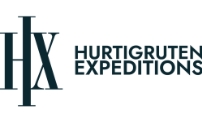 |
LEADER - GEBHARD RAINER, CEO, HX EXPEDITIONS: "SEEING AND PARTICIPATING IS BELIEVING"
With the recent rebranding of HX Expeditions – previously HX Hurtigruten Expeditions, it was the perfect timing to sit with the leader and understand how the pioneering expedition company is redefining mindful adventure travel through science, sustainability, and authentic discovery. |
Category: Worldwide - Industry economy
- Interviews and portraits
- Tourism - Interviews
Interview made by Sonia Taourghi on Monday 21 July 2025
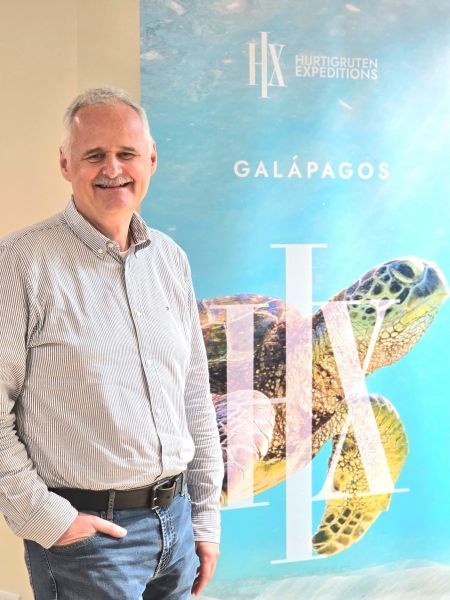 Gebhard Rainer, CEO, during one of his rare visits to the office - HX Expeditions
Photo credit © Sonia Taourghi / Journal des Palaces
Keen to reconnect with his native Europe after decades of globe-trotting, in early 2024, Rainer took the helm of HX Expeditions, the expedition cruise company with 130 years of polar exploration heritage. The recent rebrand officialised in February 2025 signals a bold message about what the company is all about "mindful adventure for the curious traveller". Under Rainer's leadership, HX is positioning itself as the industry leader in expedition cruising that prioritises destination over amenities, substance over luxury theatrics, and genuine scientific discovery over staged entertainment.
Our interview embarked on a voyage into the career and world of a hotelier with over four decades in luxury hospitality. Gebhard Rainer brings a wealth of expertise to one of the world's most unique travel experiences, including 26 years with Hyatt where he last served as CFO, six and a half years as CEO of Sandals resorts, and experience in luxury retail with Coach. His journey from hotel management in Austria to leading operations across the Middle East, Asia, the Caribbean, and the United States has given him an unparalleled understanding of what drives meaningful travel.
What sets Rainer apart is his genuine passion for environmental stewardship and scientific discovery. This isn't simply corporate strategy – it's personal conviction that drives every aspect of HX's operations. From employing the industry's first Chief Scientist to maintaining science laboratories on every vessel, Rainer has transformed HX into a platform where travellers don't just observe remote destinations, they actively participate in groundbreaking research that contributes to our understanding of climate change, marine biology, and extreme ecosystems.
Journal des Palaces: You've spent decades in luxury hospitality – what changed your mind about cruise ships?
Gebhard Rainer: When I was first approached about an expedition cruise company, my immediate reaction was "cruise, no way." I'm not particularly fond of cruises – I dislike large cruise lines and their massive ships, and I'm concerned about their environmental impact. It's personal. I don't see myself ever spending a holiday on a big ship, and it's not attractive to me. But when I had a closer look at what expedition cruising really is, specifically what HX does in sustainability, science, and education, I realised it correlates very much with my own personal values.
We're not a cruise company. Not at all. We are an expedition company that sells experiences. Our focus is on the destination, not the ship. The ship is a means of transport that has to be top quality and luxurious, but the focus is on the curious traveller seeking mindful adventure in destinations that will change their mindset and help them see the world with different eyes.
It has to be at a certain luxurious level, although luxury is an interpretation that everybody has in their mind. We have high-quality food in a very casual environment, excellent cabins and suites, but all very relaxed. You don't have to dress up for dinner in a suit and tie. We don't serve caviar and champagne, although you're welcome to have them if you'd like. We don't have white-gloved waiters – our staff have uniforms, but it's not that formal. We don't have butler service, but we do have a spa on board, fitness centres, and different restaurants with international cuisine.
When I first saw our suites, I made a statement to our colleagues: I'm coming from hospitality, and I can tell you, these are comparable to the best suites in luxury hotels. There's not much difference there. You don't have to be rough to get to an expedition cruise – it doesn't have to be extreme. You may have an extreme experience in the destination because we don't control the weather, but once you're on board, you can be assured of the best comfort and highest quality.
I also wanted to come back to Europe – I left Austria more than 40 years ago, and the older you get, the more your roots call you back.
Who exactly are these "curious travellers" you're targeting?
Our demographic is typically educated, often with academic or scientific backgrounds – people who understand and are interested in science. Many are retired because these expeditions require a time commitment, anywhere from 10 days to four months. But we're also attracting younger demographics in their 30s and 40s who pay attention to climate change and want travel that correlates with their values.
It's interesting – when you go on board and talk to customers, they basically know everything. You try to tell them something, and they say, "I know that already." Then you go through the voyage, and three days in, you suddenly see them saying, "Oh my God, I didn't know this. I didn't expect that. This is fantastic." By the time they leave, there's a mindset change. We're actually doing a study with the University of Tasmania on this behaviour change – monitoring guests before, during, and after voyages to see how long the change lasts and what impact they have when they return home.
You mentioned science labs on every ship – that sounds expensive for what some might see as marketing?
We were the first in this industry to have science labs on all ships and employ a Chief Scientist as permanent staff. But this isn't marketing – it's real science. Dr. Verena Meraldi, our Chief Scientist, has put together programmes where we collaborate with over 30 scientific institutes worldwide.
We have scientists on board who conduct ongoing research. We have projects like Happy Whale, where guests photograph whale flukes for migration tracking, and whale behaviour studies through University of Southern California. I personally participated in whale research in Antarctica – going out on a Zodiac with a scientist who used a crossbow to collect skin samples from humpback whales. We had three Zodiacs with customers 100 feet behind us watching.
Last year, we provided nearly 2,000 cabin nights for scientists who lacked funding to reach their research stations. We simply provide transportation because government funding has been cut and they can't get there. In exchange, they hold lectures for our guests. When I went to Svalbard, someone asked me, "Can you guarantee I'll see a polar bear?" I said, "I'm sorry, I can't guarantee that. We don't stage polar bears on the beach."
What advice would you give to hospitality professionals considering expedition work?
First, inform yourself well about what an expedition actually means and the variety of different expedition experiences that exist. It's still a niche product with players who have different views on what expedition should be. Some emphasise luxury on board, some focus on land experiences, some are so small they're just trying to survive – and you've got to be careful about what shortcuts are potentially being taken, because it is dangerous.
You have to be curious, adventurous, and able to live with the unexpected. You need flexibility to pivot very quickly because most of the time, things don't work out the way you want them to. It actually isn't that different from luxury hospitality – it's all about the customer, being customer-centric, revolving around experience. This is actually what made my experience at Coach relevant: fashion retail is customer-centric, so very similar to luxury hospitality. The emphasis in expedition is maybe stronger on the experience because you're selling the intangible, selling a dream that people often don't understand themselves until you explain it.
But the working conditions are unique. You work on rotation – six weeks on, six weeks off for marine crew; three months on, three months off for hotel staff; and expedition teams anywhere from six weeks to three months depending on where we go. You have to like it, and once you have that bug, you get hooked. When our people are off the ship, within a week they can't wait to get back because they're missing something. But if you don't like the confined environment, if you can't handle not being able to walk out the door when pressure gets to you, you exit very quickly. You do one rotation and you're gone.
There's loyalty when somebody gets that bug. They stay and keep coming back. But you either like it or you don't – there's no middle ground.
Tell us more about the teams and the type of profiles that make your crews.
We have three distinct teams on board. The marine team – bridge and engine room – are predominantly Scandinavian, especially Norwegian, which reflects our heritage and Norwegian flag operation. The hotel crew has European management but predominantly Filipino service staff. Our teams have a natural way with hospitality that works brilliantly for us, and they connect very well with guests.
But our expedition team is what really sets us apart. Unlike most companies that contract these roles, we employ our expedition team directly because we want longevity and retained expertise. Some of our experts have been doing Arctic expeditions for 20–30 years and are true explorers in their personal lives – people who've gone to the North and South Poles with dog sledges, who kayak down the Grand Canyon in their private time. You need people who know these areas because if you send an expedition leader to Antarctica for the first time without someone who's been there before, it's a very dangerous proposition.
Speaking of danger, especially in the wild, how do you manage the unexpected?
We actually won the Princess Royal award in the UK for our polar bear training. Between March and June, regulations say you can't get closer than 500 metres to a polar bear because it's mating season. The rest of the season it's 300 metres. But that's all very well; they can smell you about a kilometre away and see you before you’re even aware of their presence.
You can't outrun a polar bear, but you can react to it. Our expedition leaders carry weapons as a last resort, but they're trained in how to react when a polar bear approaches. They're typically looking for food when they get close, so they're hungry and dangerous. The training we developed has been recognised industry-wide for its professionalism.
How much of each expedition actually goes according to plan?
Part of the expedition is the unknown – it happens quite often when we go into remote areas that you never know where you can actually go depending on weather and ice conditions. Our teams have to have Plan A, Plan B, Plan C, Plan D, and Plan E because they just don't know what's going to happen.
In January when I went to Antarctica, the weather turned bad on Monday, and we couldn't get into a planned bay. The captain and expedition leader made a decision to go into an unexplored bay where nobody had been before – no maps, no shipping channels, nothing. We have the capability to chart new routes using sonar. You end up in a bay where you don't know the wildlife, don't know what's there. True expedition, true exploration. It's exciting for guests, but it requires people who are really agile and can pivot very quickly because most of the time, things don't work out the way you want them to.
Your sustainability efforts seem to go beyond typical corporate initiatives?
Sustainability is one of our three core pillars. Beyond our hybrid ships with electrical propulsion and recycling everything on board, we collect three to four tons of garbage annually from remote beaches with our guests – it's shocking how much plastic reaches places like Svalbard through ocean currents. Through our Green Stay initiative, we save about 600,000 litres of water annually by giving guests the option to skip daily sheet changes, then contribute to our foundation on their behalf.
But our approach to communities is what I'm most proud of. This year, we arranged for Greenlandic chef Inunnguaq Hegelund to bring his team aboard for East Greenland voyages. He prepares traditional food and explains how they preserve provisions for winter, how they hunt for survival. We're sourcing 30% from local suppliers – meats, fish, seafood, micro-greens, and even Greenlandic beers from QAJAQ Brewery. It's educational and very interesting to understand the lifestyle of these remote communities.
We've built links into communities through employing Greenlandic people who put itineraries together and research for us on the ground. We also bring community groups aboard to show them our environmental systems so they understand we're not leaving additional pollution behind. We want to turn this into a positive impact in the areas we go into.
What's driving your expansion plans for the 130-year anniversary?
We're an old company, but a new brand – 130 years old, but really a startup since becoming independent in February. We operate five ships, including one charter, with four that we own rotating between the Arctic and Antarctic by season. We're constantly investing in our fleet – we've just completed a multi-million pound renovation of MS Spitsbergen, adding a new Science Centre on deck 6 and a Bistro Brygga for flexible dining, plus refreshing the exterior in our new indigo blue and sand livery.
We have specific anniversary voyages planned, plus we're guaranteeing Northern Lights sightings in Northern Norway due to exceptional celestial conditions. If guests don't see them with their eyes open, we offer a free voyage. We have new voyages exploring uncharted territories in Antarctica and going as far north as possible in Alaska with daily landings.
Our most exciting development is our Northwest Passage arrangement with Inuit communities in Arctic Canada. They've designed itineraries that they run themselves – we don't take any profit, they get the full payment for tours exposing guests to their fishing methods and survival techniques.
Through the HX Foundation, we launched the "Big Blue Bag" initiative with BBC biologist Monty Halls, targeting coastal communities in the UK. It has four smaller bags addressing microplastic identification, wildlife migration monitoring, ocean temperature tracking, and beach clean-up. We're working with schools in remote communities, building football fields, contributing to libraries and providing computer equipment. The expedition cruise industry contributes towards science and awareness about sensitive areas on this planet. By doing what we do, we're raising awareness and making people see the world with different eyes, hopefully bringing about change in their personal lives.
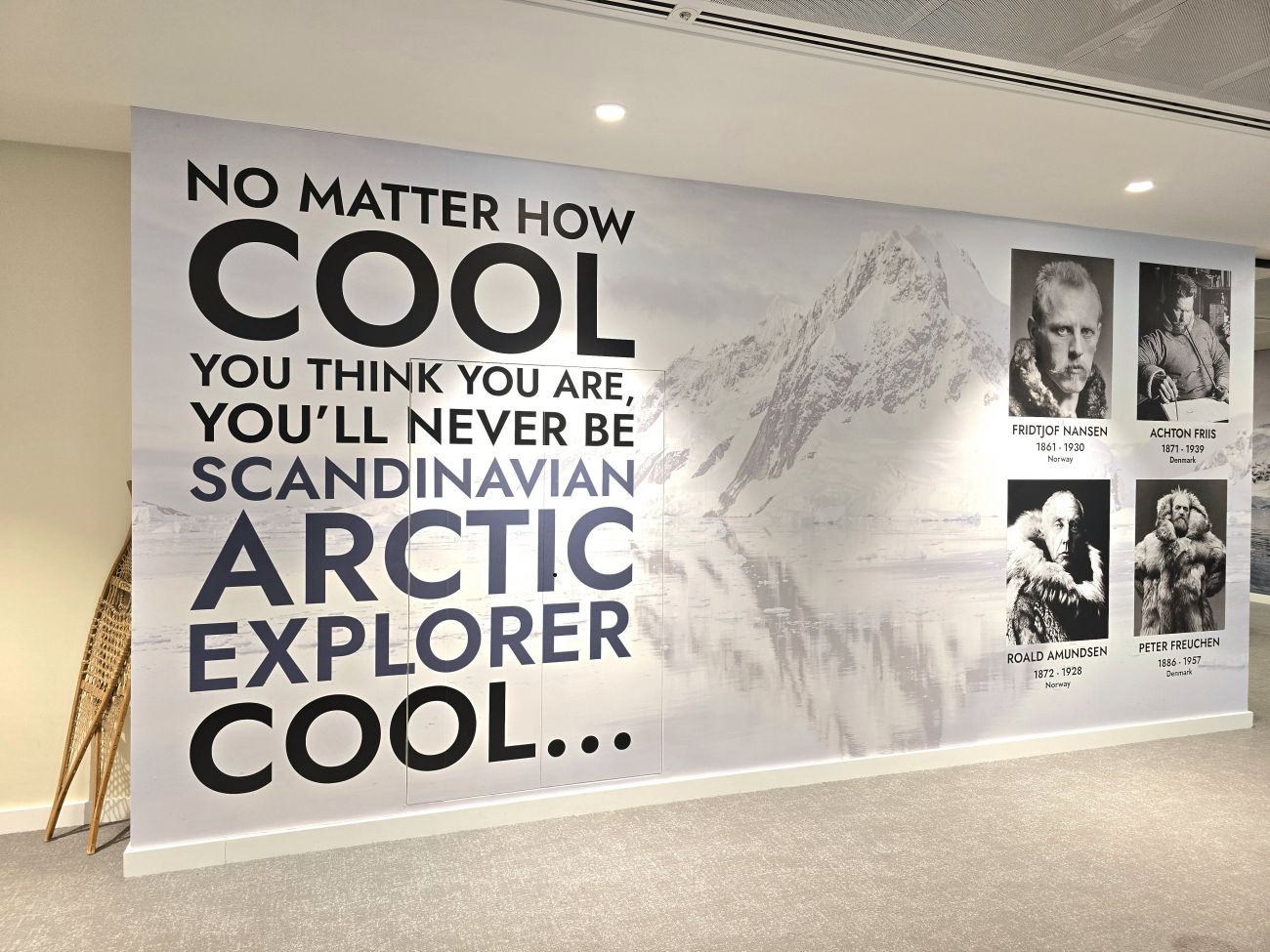 The entrance wall showcasing 130 years of polar heritage - HX Expeditions
Photo credit © Sonia Taourghi / Journal des Palaces
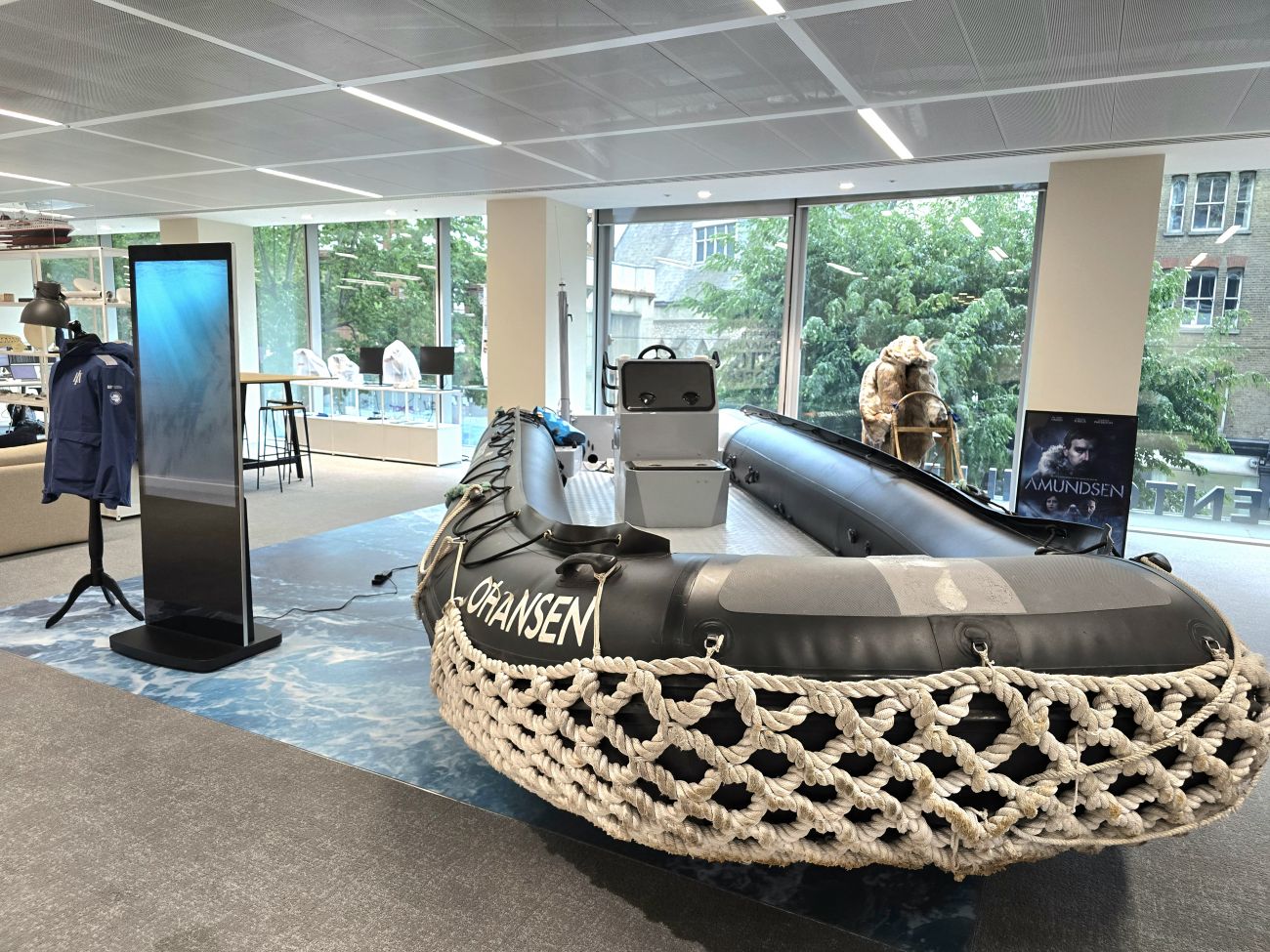 The headquarters of the centenary expedition company is based in London, United-Kingdom - HX Expeditions
Photo credit © Sonia Taourghi / Journal des Palaces
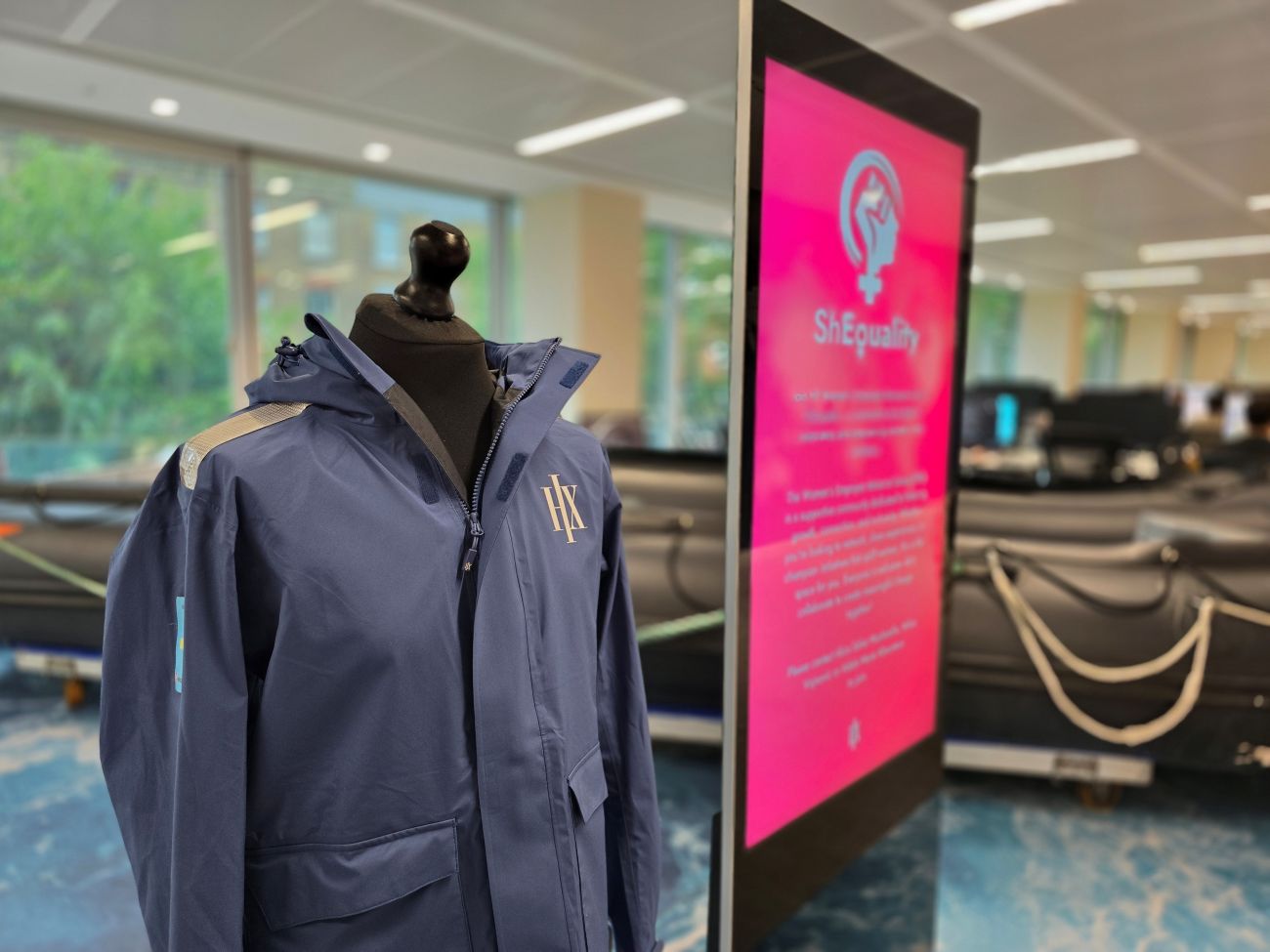 Gear for the polar expeditions and scientific research - HX Expeditions
Photo credit © Sonia Taourghi / Journal des Palaces
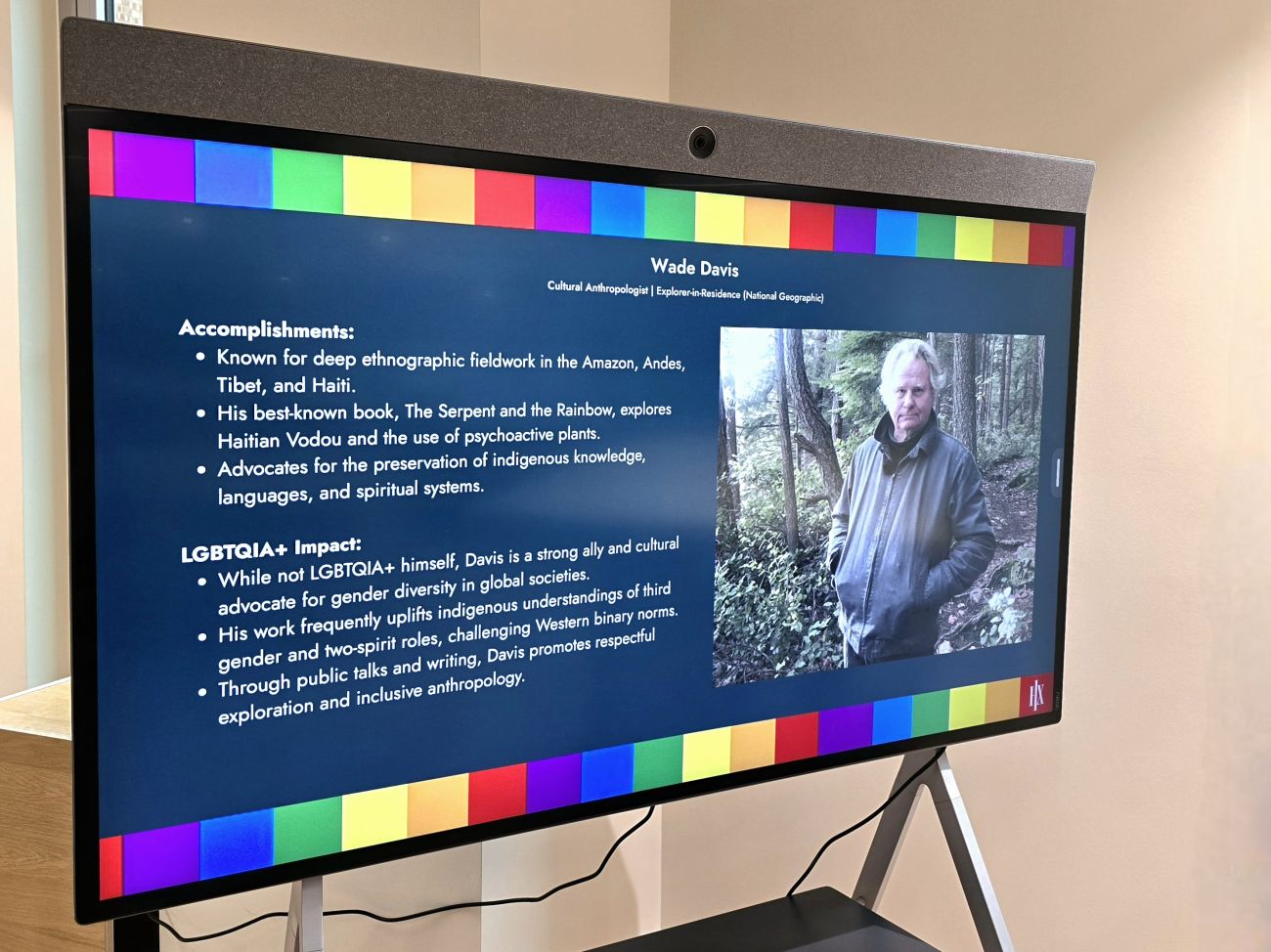 Highlighting Wade Davis, anthropologist and ethnobotanist, former National Geographic Explorer-in-Residence - HX Expeditions
Photo credit © Sonia Taourghi / Journal des Palaces
|
|







